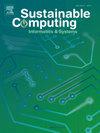Distributed data storage using decision tree models and support vector machines in the Internet of Things
IF 5.7
3区 计算机科学
Q1 COMPUTER SCIENCE, HARDWARE & ARCHITECTURE
引用次数: 0
Abstract
The rapid development of IoT technologies generates a considerable amount of diverse and distributed data, mostly real-time and sensitive. Due to the diversity of data types (text, image, video) and geographical dispersion, efficient management becomes essential for maintaining performance and ensuring speedy responses to users. Traditional data storage methods are unfit for dynamic IoT environments, due to their lack of scalability, energy efficiency, and bandwidth. Recent research indicates that machine learning might offer enhanced security with reduced latency and improved energy efficiency. However, most of these techniques are complex and resource-intensive, hence inappropriate for resource-constrained IoT devices. While various developments have been made in this regard, a holistic approach that not only forecasts the requirements for data replication but also selects the most optimized storage nodes remains an unmet challenge. The presented paper offers a hybridized approach by incorporating Decision Trees and SVM, which manage data optimally with higher speeds and reduced computational costs. Simulation results indicate that this method can reduce access latency by up to 22.2–41.6 %, increase accuracy by 5–12.3 %, and improve resource utilization efficiency by 7.7–15.3 %.
物联网中使用决策树模型和支持向量机的分布式数据存储
物联网技术的快速发展产生了大量多样化和分布式的数据,这些数据大多是实时和敏感的。由于数据类型(文本、图像、视频)的多样性和地理上的分散,有效的管理对于保持性能和确保对用户的快速响应至关重要。由于缺乏可扩展性、能效和带宽,传统的数据存储方法不适合动态物联网环境。最近的研究表明,机器学习可以通过减少延迟和提高能源效率来增强安全性。然而,这些技术大多复杂且资源密集,因此不适合资源受限的物联网设备。虽然在这方面已经取得了各种进展,但一个既能预测数据复制需求又能选择最优化的存储节点的整体方法仍然是一个未满足的挑战。本文提出了一种结合决策树和支持向量机的混合方法,以更快的速度和更低的计算成本对数据进行优化管理。仿真结果表明,该方法可使访问时延降低22.2 ~ 41.6 %,精度提高5 ~ 12.3 %,资源利用效率提高7.7 ~ 15.3 %。
本文章由计算机程序翻译,如有差异,请以英文原文为准。
求助全文
约1分钟内获得全文
求助全文
来源期刊

Sustainable Computing-Informatics & Systems
COMPUTER SCIENCE, HARDWARE & ARCHITECTUREC-COMPUTER SCIENCE, INFORMATION SYSTEMS
CiteScore
10.70
自引率
4.40%
发文量
142
期刊介绍:
Sustainable computing is a rapidly expanding research area spanning the fields of computer science and engineering, electrical engineering as well as other engineering disciplines. The aim of Sustainable Computing: Informatics and Systems (SUSCOM) is to publish the myriad research findings related to energy-aware and thermal-aware management of computing resource. Equally important is a spectrum of related research issues such as applications of computing that can have ecological and societal impacts. SUSCOM publishes original and timely research papers and survey articles in current areas of power, energy, temperature, and environment related research areas of current importance to readers. SUSCOM has an editorial board comprising prominent researchers from around the world and selects competitively evaluated peer-reviewed papers.
 求助内容:
求助内容: 应助结果提醒方式:
应助结果提醒方式:


